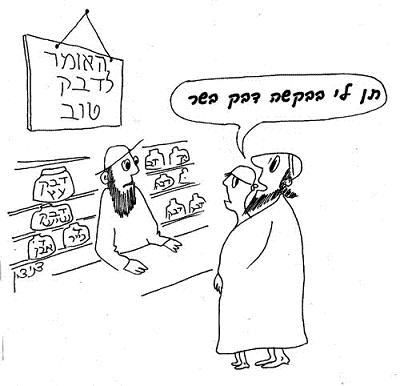
Though according to Torah law gentiles are forbidden to have incestuous relationships, one of the scholars, Rav Huna, ruled that a gentile is permitted to marry his own daughter. (Since the Talmudic text was edited only after it was commonly passed down orally, there are different versions of some scholars’ sayings, as is only natural amongst people, for whom forgetfulness is a common state. These alternate versions begin with the words “Some say.”) Some say the opposite: Rav Huna ruled that a gentile is forbidden to marry his own daughter, and his proof comes from Adam, who did not marry his own daughter. [Adam, and all generations after until the giving of the Torah at Sinai, are considered gentiles.] The students rejected this proof and said that Adam did not marry his own daughter scholars he was forbidden to, but because he intended her for his son Cain, for “The world will be built through chesed,” and in the Scriptures it is written “If a man takes his sister…so that he sees her nakedness and she sees his nakedness, it is a chesed” (Leviticus 20:17).
The scholar Rav Hisda ruled that incest is universally permitted to slaves and maidservants, so a slave is permitted to marry and sleep with his own mother or sister or any other member of his family. Though gentiles, according to Torah law, are forbidden to practice incest, slaves are permitted — their personal status is somewhere between that of a gentile and of a Jew, so the laws against incest do not apply to them.
A different scholar added: A gentile who bought a slave and gave that slave a maidservant as a common-law wife. If afterwards the master slept with the maidservant, he would be liable to the death penalty. Since slaves and maidservants aren’t subject to standard personal law, the scholars clarified at what point a maidservant is considered a common-law wife. Answer: As soon as the local residents call her “so-and-so’s girl.” When is she permitted to every man? Answer: As soon as she goes out in public without a head covering.
One of the scholars, Rav Chanina, also ruled that a gentile is forbidden to have anal sex with his wife. This ruling was derived from the verse “and cleave to his wife, and they shall become one flesh” (Genesis 2:24). This implies the sort of sex which causes a couple to be joined is permitted, but any other style is forbidden, and since a woman is not satisfied enough by anal sex and so does not cleave to her husband, it is forbidden. One of the scholars, Rava, asked how it is possible that anal sex is permitted to a Jew but forbidden to a gentile. It is well known that anything permitted a Jew must also be permitted to a gentile. Given this argument Rava made a different determination: a gentile who committed adultery with a gentile married woman through anal sex is exempt from punishment, based on the way “cleave to his wife” was learned above. It is his wife he must cleave to, not a different married woman, through sex which leads to cleaving — regular and not anal intercourse.
(Babylonian Talmud, Tractate Sanhedrin 58b)
